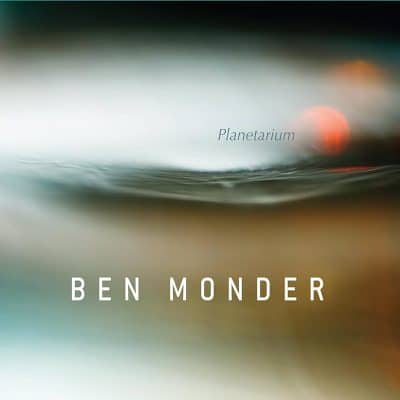Ben Monder Planetarium
 Ben Monder
Ben Monder
Planetarium
Sunnyside
Ben Monder’s Planetarium has been an ongoing project for the guitarist for the past ten years, now resulting in a full three CDs. Overwhelming at times, there are moments where I thought to myself that this is what music in heaven must sound like. At other times, the darker, mysterious tones had my thoughts wandering to distant places. None of this should be surprising to those who heard Monder’s contributions to Maria Schneider’s Grammy-winning 2020 Data Lords. Monder, along with saxophonist Chris Speed, have already completely reshaped the sound of The Bad Plus, who have another album forthcoming soon. Yet, those are sideman projects. Give Monder the opportunity to paint his own canvas and he goes to work painstakingly, ensuring every note and sonic element is just right. Planetarium has a balance of sonic poems coupled with improvisational passages mostly built on the layering of guitars, both acoustic and electric, and voices from the three vocalists. On paper it seems simple enough – a rhythm section of bassist Chris Tordini and shared drum duties between Ted Poor, Satoshi Takeishi, and co-producer Joseph Branciforte.The vocalists are Theo Bleckmann, Charlotte Mundy, Theo Sable, and Emily Hurst. Personnel differs slightly on each disc. For example, Disc 2 only has the voice of Bleckmann while Disc One has Bleckmann and Mundy and Disc Three has all four vocalists, though only one track with more than one. Not all tracks have vocals, bass, or drums as Monder has solo moments as well.
The title itself suggest orbits, galaxies, bright against dark, and vast mystery. The music does justice to all those and more. Disc One sneaks in so quietly that you’ll be checking the volume on your player. “Ouroboros II” uses an ostinato of 16th note triplets divided in different ways over bars of 13/8 with Takeishi stirring the pot underneath before Mundy’s layered, choir-like voices create some tension and release and shining harmonies against Monder’s robust tones. The 23-minute “The Mentaculus,” from the concept ‘probability map of the universe” from the Coen Brothers film, A Serious Man, finds Monder in a trio setting with Tordini and Poor. The guitarist shows his rock tendencies through the use of the overdrive pedal, mostly improvising over a simple phrase, modulating tone and tempo as he winds through it. Put “1973” in the ‘heaven” category as Bleckmann’s vocals leave a Gregorian chant effect while his technique in the piece named for the Chinese poet Li Po, has him in synch with Monder’s dense, distorted guitar. Put that one in the “dark, mysterious” category and chalk up Monder’s solo layered guitars in the title track as contemplative and brooding, adjectives that apply to several of these on the three discs.
“Globestructures: Option II,” the opener on Disc Two is another solo layered guitar piece that unlike some of the simple patterns heard on Disc One, is rather complex, labyrinthian in fact, and rife with sustained, tolling bell-like notes and chords. The twenty plus minute “Ataraxia” was composed upon receipt of a grant and involves all four players, Bleckmann, Tordini, and Branciforte as Breckmann soars above shifting guitar patterns. Put this in the ‘heaven” camp as it rings with a glorious glow throughout. The vocalist and bassist return for “Onsulian Spriing,” imagining Spring on an unnamed planet, it definitely has that ethereal, cosmic air as Bleckmann’s vocal blends so remarkably well with the guitars. Monder goes it alone blending the acoustic and electric for an enchanting take on Rogers and Hart’s “Where or When.”
The solo approach also kicks off Disc Three for”3PSC’ a full 21 minutes of pensive layers that fill the aural space like beacons of light at sea (or more aptly put, in the universe). It’s one of the most engaging pieces on the three discs, Monder employing concepts learned from the late guitarist/educator Mick Goodrick, who influenced many including Pat Metheny. As in many of these pieces, Monder’s tone is immaculate in this largely scalar piece. Vocalist Mundy makes a cameo in the brief “Urobo,’ leading into “Ouroborus I,” a guitar-drum duet that shifts the pattern from the opener on Disc One. Then we are back to that dichotomy of the heavenly and dark with “Noctivigant” representing the former and the dual vocal (Bleckmann and Hurst) contributing to Monder’s haunting soundscape in “Collinsport,”named for a fictional, (likely spooky) town in a TV soap opera. In a surprising sleight of hand, Monder concludes with a brief quote on his baritone guitar for the highly recognizable “Wayfaring Stranger,” with Theo Sable on the vocal.
Technically brilliant, vividly evocative, and emotionally deep, Monder is spellbinding in this work of utmost craftsmanship.
Buy Us a Cup of Coffee!
Join the movement in supporting Making a Scene, the premier independent resource for both emerging musicians and the dedicated fans who champion them.
We showcase this vibrant community that celebrates the raw talent and creative spirit driving the music industry forward. From insightful articles and in-depth interviews to exclusive content and insider tips, Making a Scene empowers artists to thrive and fans to discover their next favorite sound.
Together, let’s amplify the voices of independent musicians and forge unforgettable connections through the power of music
Make a one-time donation
Make a monthly donation
Make a yearly donation
Buy us a cup of Coffee!
Or enter a custom amount
Your contribution is appreciated.
Your contribution is appreciated.
Your contribution is appreciated.
DonateDonate monthlyDonate yearlyYou can donate directly through Paypal!
Subscribe to Our Newsletter
Order the New Book From Making a Scene
Breaking Chains – Navigating the Decentralized Music Industry
Breaking Chains is a groundbreaking guide for independent musicians ready to take control of their careers in the rapidly evolving world of decentralized music. From blockchain-powered royalties to NFTs, DAOs, and smart contracts, this book breaks down complex Web3 concepts into practical strategies that help artists earn more, connect directly with fans, and retain creative freedom. With real-world examples, platform recommendations, and step-by-step guidance, it empowers musicians to bypass traditional gatekeepers and build sustainable careers on their own terms.
More than just a tech manual, Breaking Chains explores the bigger picture—how decentralization can rebuild the music industry’s middle class, strengthen local economies, and transform fans into stakeholders in an artist’s journey. Whether you’re an emerging musician, a veteran indie artist, or a curious fan of the next music revolution, this book is your roadmap to the future of fair, transparent, and community-driven music.
Get your Limited Edition Signed and Numbered (Only 50 copies Available) Free Shipping Included
Discover more from Making A Scene!
Subscribe to get the latest posts sent to your email.










